| Date & Time: | Sep 28 2013, from 23:20 to 23:31 JST(+0900) |
| Composed 2 shots with 10 minutes exposed |
| Optical: | TAKAHASHI 12.5cm(4.9") fluorite refractor, stopped D=100mm (f=1000mm, F10.0) |
| with SBIG DSS7 Spectrometer |
| Auto-guided with VIXEN ATLUX Equatorial |
| Cooled CCD Camera: | SBIG ST-402ME (Temp.: -10°C) |
| Location: | Ooizumi, Hokuto city, Yamanashi pref. |
Upper strip: taken spectrogram, Lower strip: stretched 3-pixel-width & pseudo-colored image
| Absorption line | He I | Hβ | Fe VIII | Fe VI |
|---|
| Observed WL, λm | 5913.5 Å | 4883.4 Å | 5181.2 Å | 5208.7 Å |
| WL in literature, λ0 | 5874.9 Å | 4861.3 Å | 5159 Å | 5176.4 Å |
| Red shift, z | 6.570×10-3 | 4.546×10-3 | 4.303×10-3 | 6.240×10-3 |
| Recession velocity, v (km/s) | 1965 | 1361 | 1288 | 1866 |
| Estimated distance, D (mill ly-yr) | 91.5 | 63.4 | 60.0 | 86.9 |
| (average) | 75.4 mill. lt-yr |
|---|
z= (λm-λ0)/λ0
v= c*((1+z)2-1)/((1+z)2+1)
D= 3.26*v/H0 (million lt-yr)
(c: velocity of light, H0=70 km/s/Mpc)
|
The page has displayed the wavelength performance of the spectral image of NGC7331.
The galaxy includes no conspicuous active regions, cannot be detected major emission lines in the spectrogram.
But this result shows some weak absorption lines perhaps originated from stars in the galaxy.
The most striking one is equivalent to the neutral helium atoms (He I), in addition the profile shows other lines of H-beta and ionized iron atoms.
A table in right has listed and indicated estimated distance to the galaxy from observed wavelengths of four absorption lines.
The value can be calculated as about 75 million light years under an assumption that the Hubble constant of H0 has 70 km/s/Mpc.
However NGC7331 has local motion components due to the gravitational interaction with companion galaxies.
The estimated distance from the Hubble's law may include fairly larger error.
|

